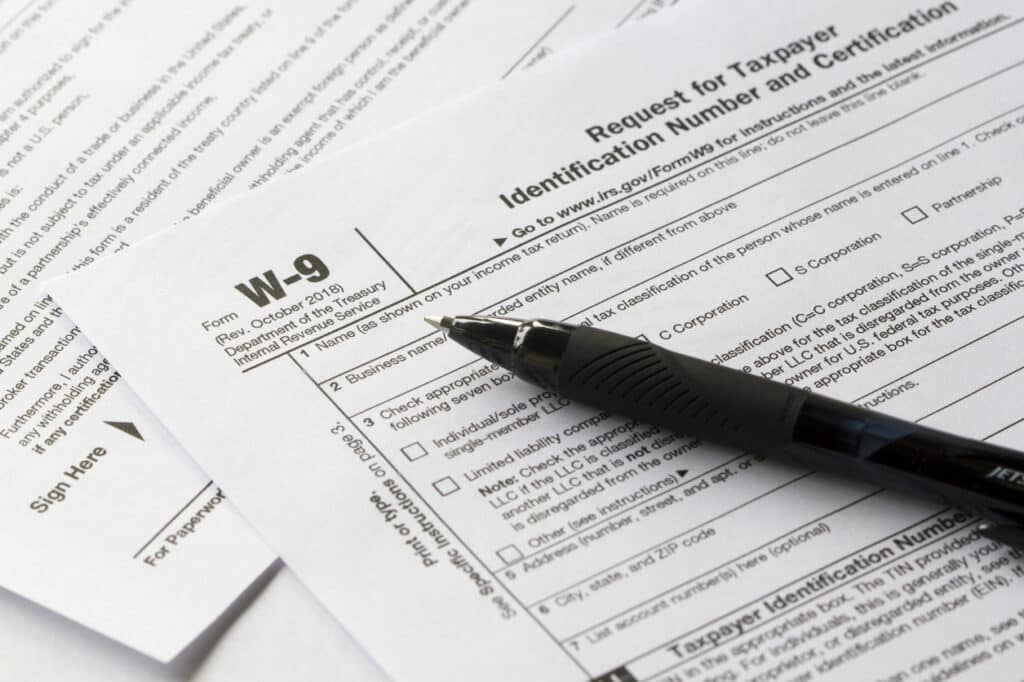What Is the Difference Between a W-8 and W-9 Tax Form?

- Is a W-8 the Same as a W-9?
- Is a W-9 Only for U.S. Citizens?
- What Is a W-8 Tax Form?
- Do I Need a W-8 or W-9 Form? Quick Reference
- What Happens If I Use the Wrong Form?
- How Does This Affect My Expat Tax Situation?
- What Are the Important Deadlines?
- How Greenback Can Help With Forms W-8 and W-9
- Related Resources
Forms W-8 and W-9 are not the same. Form W-9 is for U.S. persons (citizens, green card holders, and resident aliens) to provide their taxpayer identification number. Form W-8 is for foreign persons (nonresident aliens and foreign entities) to certify their foreign status and claim reduced withholding rates.
The difference between a W-8 and a W-9 comes down to one question: Are you a U.S. person for tax purposes?
- Form W-9: U.S. citizens, green card holders, and resident aliens, regardless of where they live
- Form W-8BEN: Nonresident alien individuals claiming foreign status or treaty benefits
- Form W-8BEN-E: Foreign entities (corporations, partnerships, trusts)
- Form W-8ECI: Foreign persons with income effectively connected to a U.S. trade or business
Here is how to determine which form you need, what each form does, and what happens if you use the wrong one.
Not Sure Whether You Should Submit a W-8 or W-9?
Is a W-8 the Same as a W-9?
No. Form W-8 and Form W-9 serve opposite purposes, are used by different people, and have different rules for validity.
| Form W-9 | Form W-8BEN | |
|---|---|---|
| Who uses it | U.S. citizens, green card holders, resident aliens, U.S. entities | Nonresident aliens and foreign entities |
| Purpose | Provides the taxpayer identification number (TIN) to the payer | Certifies foreign status and claims reduced withholding rates |
| Filed with | Not filed with the IRS; kept by the payer | Not filed with the IRS; given to the withholding agent |
| Validity | No expiration (valid until information changes) | Expires after 3 calendar years from the year it was signed |
| Default withholding without the form | 24% backup withholding | 30% withholding on U.S.-source income |
| Tax treaty benefits | Not applicable | Can reduce or eliminate the 30% withholding rate |
The most common confusion happens with Americans living abroad. Even if you have lived overseas for 20 years, you are still a U.S. person. You use Form W-9, not W-8. Your physical location does not change your tax status.
Is a W-9 Only for U.S. Citizens?
No. Form W-9 is not limited to U.S. citizens. It is required for all “U.S. persons,” which includes several categories of taxpayers:
Who uses Form W-9:
- U.S. citizens (including those living abroad)
- Lawful permanent residents (green card holders), regardless of where they live
- Resident aliens who meet the substantial presence test
- U.S. partnerships, corporations, and LLCs
- Domestic trusts and estates
Who does not use Form W-9:
- Nonresident aliens (use Form W-8BEN)
- Foreign corporations (use Form W-8BEN-E)
- Foreign partnerships and trusts (use Form W-8IMY)
- Foreign persons with effectively connected income (use Form W-8ECI)
The resident alien classification is where most people get confused. You can be a resident alien for tax purposes without having a green card. If you meet the substantial presence test, meaning you were physically present in the U.S. for at least 31 days in the current year and 183 days over a three-year weighted period, you are a resident alien and must use Form W-9.
How the Substantial Presence Test Works
The IRS uses a formula that counts days across three years:
- All days present in the current year
- One-third of the days present in the prior year
- One-sixth of the days present in the year before that
If the total equals 183 or more, you meet the test and are a resident alien. You use Form W-9.
Example: Marco, an Italian national, worked in the U.S. for 120 days in each of the last three years. His calculation: 120 + (120 / 3) + (120 / 6) = 120 + 40 + 20 = 180 days. Marco does not meet the substantial presence test and is a nonresident alien. He uses Form W-8BEN.
Certain visa categories (F, J, M, and Q visas) are exempt from the substantial presence test for a limited period. See our guide on How Are Different Visa Types Taxed in the United States.
What Is a W-8 Tax Form?
A W-8 form is a certificate that a foreign person provides to a U.S. withholding agent to establish their foreign status and, in many cases, to claim a reduced rate of U.S. tax withholding. Without a valid W-8 on file, the payer must withhold 30% of any U.S.-source income paid to a foreign person. According to the IRS, this 30% rate applies to fixed or determinable, annual or periodical (FDAP) income, including interest, dividends, rent, royalties, and certain other payments.
There are five types of W-8 forms, each designed for a different situation:
| Form | Who Uses It | When to Use It |
|---|---|---|
| W-8BEN | Nonresident alien individuals | Claiming foreign status or treaty benefits on investment income, interest, dividends, or royalties |
| W-8BEN-E | Foreign entities (corporations, partnerships claiming treaty benefits, trusts) | Documenting foreign entity status for FATCA and chapter 3 withholding purposes |
| W-8ECI | Foreign persons with effectively connected income | Income connected to a U.S. trade or business (taxed at graduated rates instead of the flat 30%) |
| W-8EXP | Foreign governments, international organizations, and foreign tax-exempt organizations | Claiming exemption from withholding under specific IRC sections |
| W-8IMY | Foreign intermediaries, foreign flow-through entities | Acting as an intermediary receiving income on behalf of other foreign persons |
W-8BEN is the most common form. If you are an individual (not an entity) who is a nonresident alien receiving U.S.-source income such as dividends from U.S. stocks, interest from U.S. bank accounts, or payments for services, W-8BEN is likely the form you need.
Claiming Tax Treaty Benefits With Form W-8BEN
One of the most valuable functions of Form W-8BEN is claiming reduced withholding rates under a U.S. tax treaty. The U.S. has income tax treaties with over 60 countries, and many of these treaties significantly reduce the 30% default rate.
Common treaty rate reductions:
| Income Type | Default Rate (No Treaty) | Common Treaty Rate |
|---|---|---|
| Dividends | 30% | 15% (many countries) or 0-5% (qualifying dividends) |
| Interest | 30% | 0% (UK, Germany, Japan, many others) |
| Royalties | 30% | 0-10% (varies by country and type) |
| Pensions | 30% | 0-15% (varies; some treaties exempt entirely) |
To claim treaty benefits, you must complete Part II of Form W-8BEN, provide your country of residence, the applicable treaty article, the rate you are claiming, and your foreign tax identification number (TIN). The withholding agent applies the reduced rate when they receive a valid form.
W-8 Form Validity and Renewal
W-8 forms are valid for three calendar years from the year the form is signed, plus the remainder of the signing year. For example, a W-8BEN signed on March 15, 2025, remains valid through December 31, 2028. After that, you must provide a new form, or the payer reverts to 30% withholding.
There is an exception: if no treaty benefit is being claimed and the form is supported by documentary evidence provided within 30 days, the W-8BEN can be valid indefinitely. However, most people claiming treaty benefits must renew every 3 years.
You must also provide a new W-8 form within 30 days if your circumstances change, such as becoming a U.S. resident, changing your country of residence, or becoming a U.S. citizen.
Do I Need a W-8 or W-9 Form? Quick Reference
Use this table to determine which form applies to your situation:
| Your Situation | Form Needed | Why |
|---|---|---|
| U.S. citizen living in the U.S. | W-9 | U.S. person; provide TIN for 1099 reporting |
| U.S. citizen living abroad | W-9 | Still a U.S. person; citizenship does not change with location |
| Green card holder living abroad | W-9 | Permanent residents are U.S. persons for tax purposes |
| A Foreign national working in the U.S. on an H-1B visa who meets the substantial presence test | W-9 | Resident alien status requires a W-9 |
| A Foreign national who does not meet the substantial presence test | W-8BEN | Nonresident alien; claim foreign status and treaty benefits |
| Foreign corporation receiving U.S. dividends | W-8BEN-E | Foreign entity; document foreign status for Chapter 3 and FATCA |
| Non-U.S. freelancer paid by a U.S. company for work done outside the U.S. | W-8BEN | A Foreign person may claim treaty benefits to reduce withholding |
| Former green card holder who relinquished status | W-8BEN | Now, a nonresident alien; foreign person status applies |
| Foreign spouse of a U.S. citizen (no election to be treated as resident) | W-8BEN | Nonresident alien unless electing resident status |
Don’t Let a Simple Form Create a Big Tax Problem
What Happens If I Use the Wrong Form?
Using the wrong form creates problems for both you and the payer.
If you are a U.S. person and mistakenly file W-8BEN:
- The payer may not issue you a Form 1099, which means the IRS will not have a matching record for your income
- You may face backup withholding at 24% when the IRS eventually flags the mismatch
- Your tax return may trigger an audit if the reported income does not match IRS records
- The payer could face penalties for failing to collect a valid W-9
If you are a foreign person and mistakenly file a W-9:
- You will not have the 30% withholding applied, which means you may owe taxes you were not prepared for when you file Form 1040-NR
- You lose treaty benefits that could have reduced or eliminated your U.S. tax
- The payer may issue a Form 1099 instead of a Form 1042-S, creating reporting mismatches
If you provide neither form:
- The payer must withhold at the maximum applicable rate: 30% for foreign persons or 24% backup withholding for U.S. persons
- You may not receive payments at all until a valid form is on file, as many financial institutions and companies require one before processing transactions
If you realize you submitted the wrong form, contact the payer immediately to provide the correct one. For income already received under the wrong form, the withholding discrepancy gets resolved when you file your annual tax return.
How Does This Affect My Expat Tax Situation?
For American expats, the W-8 vs. W-9 question is usually straightforward: you are a U.S. citizen, so you use Form W-9. But the broader tax picture is where it gets interesting, because using Form W-9 does not mean you owe U.S. taxes.
Two protections ensure most expats owe little or nothing:
- Foreign Earned Income Exclusion (FEIE): Exclude up to $130,000 of foreign earned income from U.S. federal tax for the 2025 tax year. You must meet either the physical presence test (330 full days abroad in a 12-month period) or the bona fide residence test. Claim this exclusion on Form 2555.
- Foreign Tax Credit (FTC): Claim a dollar-for-dollar credit against your U.S. tax for income taxes paid to a foreign government. This is especially valuable if you live in a high-tax country where your foreign tax rate exceeds the U.S. rate.
Using Form W-9 does not increase your tax burden. It simply ensures correct reporting, and the exclusions and credits handle the rest.
Common Expat Scenarios
- U.S. citizen with U.S. investment accounts while living abroad: You provide Form W-9 to your brokerage. No withholding is applied. You report the income on your U.S. tax return and use the FEIE or FTC to offset any tax owed.
- Digital nomad with U.S. clients: You provide Form W-9 to each client. They issue you a 1099-NEC at year-end. You report the income on Schedule C and claim the FEIE to exclude up to $130,000. If you are a digital nomad, carefully tracking your days abroad is essential to qualify.
- Foreign spouse of a U.S. citizen: Your spouse provides Form W-8BEN to U.S. payers unless you both elect to file jointly and treat the spouse as a U.S. resident for the full year under the nonresident spouse election. If you make this election, your spouse would then use Form W-9.
- Former green card holder now living abroad: After relinquishing your green card, you are a nonresident alien. You switch from Form W-9 to Form W-8BEN for any U.S. payers, and you may claim treaty benefits to reduce withholding on U.S.-source income.
What Are the Important Deadlines?
| Form | When to Provide | Renewal |
|---|---|---|
| W-9 | Before the first payment or when requested by a payer | No expiration; provide a new form only if your information changes |
| W-8BEN | Before receiving U.S.-source income | Every 3 calendar years from the year signed (or within 30 days of a change in circumstances) |
| W-8BEN-E | Before receiving U.S.-source income | Every 3 calendar years, unless certain FATCA statuses allow indefinite validity |
If your W-8 form expires and you do not provide a new one, the payer must begin withholding at 30% on your next payment. Set a reminder to renew before the expiration date.
How Greenback Can Help With Forms W-8 and W-9
Whether you need a W-8 or W-9 depends on your tax status, but the form itself is just one piece of your overall U.S. tax picture. Your Greenback accountant reviews your full situation, including your residency status, income sources, treaty eligibility, and available exclusions, to ensure every part of your return is handled correctly.
No matter how late, messy, or complex your return may be, we can help. You will have peace of mind, knowing that your taxes were done right.
If you are a visa holder new to the U.S. tax system, we specialize in helping H-1B holders, green card holders, and international students determine their correct filing status and claim all available benefits. Learn more about how we help visa holders.
If you are ready to be matched with a Greenback accountant, click the get started button below. For general questions about W-8 and W-9 forms or working with Greenback, contact us, and one of our Customer Champions will be happy to help.
Submit the Right Form With Confidence
This article is for informational purposes only and does not constitute tax, legal, or accounting advice. Tax status determinations depend on your individual circumstances. For guidance on your specific situation, contact Greenback to speak with a tax specialist.
Related Resources
- Resident Alien vs. Nonresident Alien: Tax Differences Explained
- Form 1040-NR: Tax Filing Guide for Nonresident Aliens
- How to File as a Dual-Status Alien
- Welcome to the U.S.: Your First-Year Tax Guide as a New Resident Alien
- What Is Form W-7? ITIN Application Guide
- How to Claim the Foreign Earned Income Exclusion
- Foreign Tax Credit: How Expats Can Reduce U.S. Taxes
- Nonresident Spouse Election: Filing Jointly With a Non-U.S. Spouse
- Form 8833: How to Claim U.S. Tax Treaty Benefits
- How to Abandon Your Green Card: Step-by-Step Guide


